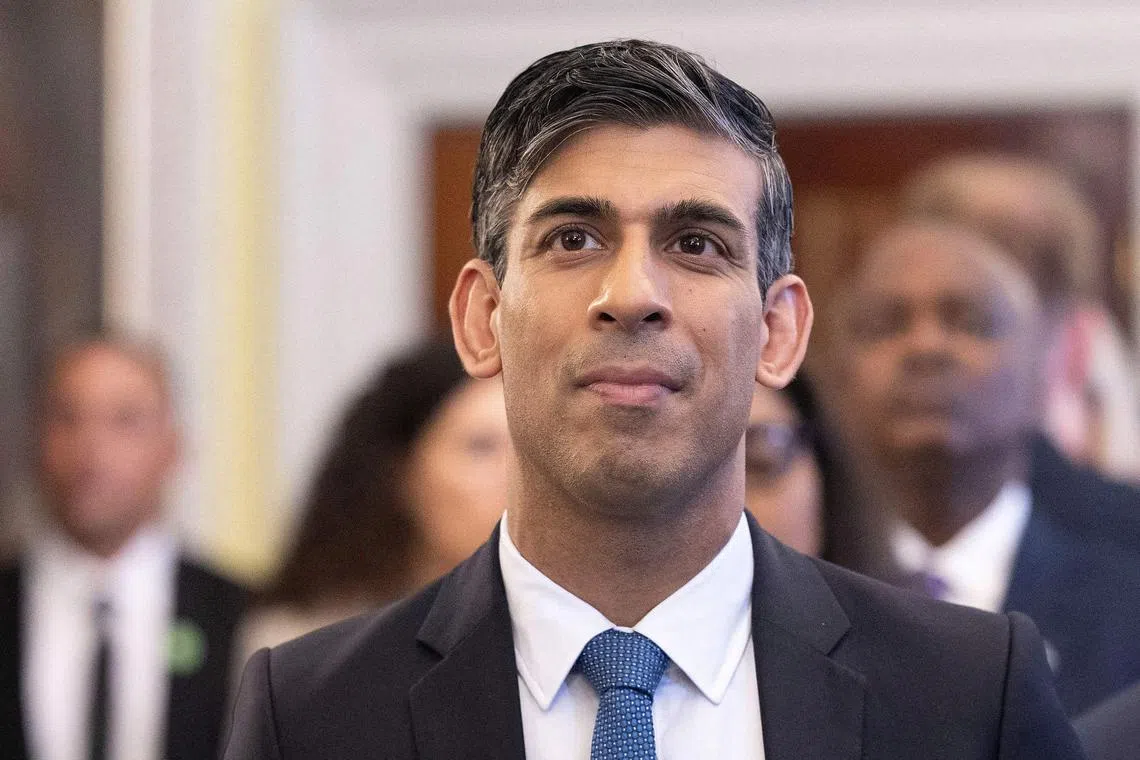Sunak’s Tories suffer stinging rebuke in UK local elections
Sign up now: Get ST's newsletters delivered to your inbox

The results suggest Mr Rishi Sunak still has a long way to go to turn his party’s fortunes around.
PHOTO: AFP
LONDON – Mr Rishi Sunak’s UK Conservatives lost scores of local council seats
It is a result that suggests the ruling party is in danger of losing power in a national vote that’s expected in 2024.
With most of the results declared, the Conservatives lost more than 1,000 seats.
The main opposition Labour Party gained roughly 500 and the centrist Liberal Democrats, which surprised odds-makers as perhaps the best performer, picked up around 400, chipping away at the Conservative rural heartland in the south.
Another smaller party, the Greens, also made more than 200 gains.
The results, if extrapolated across the whole of the United Kingdom, implied that Labour could carry a national vote share of 35 per cent, according to BBC polling analysis. The Tories would have 26 per cent, while the Liberal Democrats would come in third with 20 per cent.
“The nine-point lead that Labour is projected to have over the Conservatives is the largest lead that the Labour Party have recorded on our measure since losing power in 2010,” said Mr John Curtice, a BBC polling analyst, who is also a professor of politics at Strathclyde University.
The results suggest Mr Sunak still has a long way to go to turn his party’s fortunes around after a chaotic 2022 that saw the Tories oust two prime ministers: Mr Boris Johnson and Ms Liz Truss.
They are also the first broad evidence that Labour leader Keir Starmer’s double-digit national polling lead is translating into results on the ground, which will give the opposition confidence ahead of a general election that Mr Sunak must call by January 2025.
“Make no mistake: We are on course for a Labour majority at the next general election,” a jubilant Mr Starmer told supporters in Chatham, south-east of London on Friday morning.
“We’ve changed our party, we’ve won the trust and confidence of voters, and now we can go on to change our country.”
For several Tory MPs, the results confirmed concerns, discussed privately for weeks, that the party needs something more than Mr Sunak’s promise of stability to save it from electoral oblivion in 2024.
People feel nothing in the country is working and are voting against the Conservatives, regardless of whether it is the party’s fault, said a Cabinet minister, who asked not to be named while discussing internal party concerns.
The election suggests the post-Brexit political realignment that Mr Johnson rode to victory in 2019 is shifting again, this time against the Conservatives.
One veteran Tory official said it looked like a worst-case scenario in which northerners who voted to leave the European Union were returning to Labour while southerners who voted to remain were running to the Liberal Democrats.
“It’s always disappointing to lose Conservative colleagues,” Mr Sunak told the BBC, while highlighting Tory gains in places like Peterborough, Bassetlaw and Sandwell. “The message I’m hearing from people is they want us to focus on their priorities.”
Labour made gains in the northern “Red Wall” areas of Blackpool, Middlesbrough and Stoke-on-Trent, where Mr Johnson had seen success in the 2019 general election.
Mr Starmer’s party also won southern target areas such as Medway, Plymouth and Swindon, the first time in 20 years it has taken that council in Kent.
The local elections mark the biggest test of political opinion in England ahead of the next general election.
Thursday’s polls were held in 230 of England’s 317 councils or a total of 8,058 local authority seats.
Mayoral elections were also fought in Bedford, Leicester, Mansfield and Middlesbrough. Northern Ireland holds local elections on May 18.
They are the first set of polls to take place with mandatory voter identification, which led to some voters being turned away from polling booths.
The Electoral Commission said in a statement after polls closed on Thursday that it would examine the extent of the impacts and seek to draw lessons for future votes.
“We already know from our research that the ID requirement posed a greater challenge for some groups in society, and that some people were regrettably unable to vote today as a result,” the commission said. “It will be essential to understand the extent of this impact, and the reasons behind it, before a final view can be taken on how the policy has worked in practice and what can be learnt for future elections.”
Mr Sunak’s Tories had sought to manage expectations ahead of the vote by embracing outside predictions of the potential 1,000-seat loss.
But the results will be of extra concern because the Tories were already starting from a low base on the seats that were up for election on Thursday.
They were last voted on in 2019, when both the Tories – then led by Ms Theresa May – and Labour under Mr Jeremy Corbyn took a hammering as voters opted for smaller parties and independents in protest against the Brexit paralysis that was then gripping Parliament.
Conservative Party chairman Greg Hands acknowledged the defeat in a fund-raising letter sent to supporters on Friday afternoon, even as votes were still being counted in many districts.
“These local elections are a massive wake-up call,” Mr Hands said. “If you want to stop Mr Keir Starmer, then we have to come together now.” BLOOMBERG, NYTIMES


